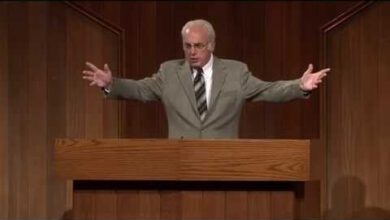Hearers and Doers (James 1:19–25) | John MacArthur
Where True Transformation Begins: Listening, Receiving, and Living God’s Word
In James 1:19–25, Scripture reveals one of the most foundational truths of the Christian life: how we receive God’s Word determines the fruit it produces in us. Pastor John MacArthur opens this passage by reminding us that a heart truly belonging to God is a heart eager to be shaped, corrected, and taught by Him.
James gives us four attitudes that transform the way we listen to Scripture: submission, purity, humility, and obedience.
1. A Heart of Submission
James begins: “Be quick to hear, slow to speak, slow to anger.” A believer’s first instinct is to run toward God’s Word, not away from it. Like the psalmist who hungered for God in Psalm 42 and Psalm 119, we should feel that same longing—never having enough, always wanting more.
Being “quick to hear” means we eagerly open Scripture, recognizing its authority. But being “slow to speak” reminds us not to rush into teaching or interpreting God’s Word lightly. Correct interpretation matters. As Paul told Timothy, we must rightly divide the truth and avoid the shame that comes from mishandling Scripture.
And then James adds: “slow to anger.” Sometimes the Word confronts us, exposes us, challenges our assumptions, or cuts into our pride. Our natural response may be irritation or resistance. But submission means laying down our defensiveness and letting God’s truth penetrate deeply.
2. A Heart Made Pure
James continues: “Put aside all filthiness and all that remains of wickedness.”
Before we can receive the implanted Word, we must remove anything that blocks it. The Greek word James uses can describe dirt on the body—or wax in the ear. In other words, sin dulls our spiritual hearing.
If we want the Word to take root and produce righteousness, we must confess, turn away from sin, and clear out anything that hardens the heart. Not some filthiness—all of it. A life cluttered with unrepented sin cannot hear God clearly.
3. A Heart of Humility
James then says: “In humility receive the implanted Word, which is able to save your souls.”
Humility is a teachable spirit—a willingness to bow to God’s authority even when His Word confronts our will. It is the posture of a surrendered heart saying, “Lord, shape me. Correct me. Lead me.”
The Word saved us when we first believed, and it continues to save us as it sanctifies us day after day. Scripture teaches, convicts, frees, strengthens, and transforms. But it only does this in the heart that receives it with humility.
4. A Life of Obedience
Finally, James says: “Be doers of the Word, and not hearers only.”
Hearing is not enough. Admiring truth is not enough. Enjoying sermons is not enough. A hearer who never obeys becomes spiritually hardened, just as the same sun that softens wax hardens clay.
James compares such a person to someone who glances in a mirror and immediately forgets what they saw. The Word reveals our true condition—but if we walk away without responding, the revelation is wasted.
But the one who looks intently into God’s perfect, liberating Word—who stays, absorbs, and obeys—this person is blessed in all they do. God’s Word frees us from sin, anchors us in truth, and leads us into life.
The Rock or the Sand
Jesus ended the Sermon on the Mount with this same picture:
The wise man hears His words and does them, building on rock.
The foolish man hears but does not act, building on sand.
Your life’s stability—your victories, your spiritual strength, your endurance—will be determined by how you approach God’s Word.
The Mark of a True Believer
A true Christian hungers for Scripture and desires to obey it. Even if we are never forced to choose between life and denying God, our faith is tested every day through choices of integrity, purity, honesty, and conviction.
God calls us not just to hear His Word—but to let it shape who we become.
